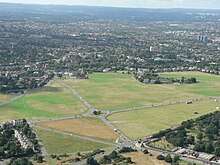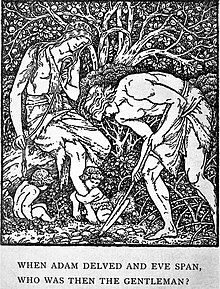John Ball (priest)
John Ball | |
|---|---|
 Medieval drawing of John Ball giving hope to Wat Tyler's rebels | |
| Born | c. 1338 |
| Died | 15 July 1381 (aged 42/43) St Albans, Kingdom of England |
| Nationality | English |
| Occupation | Priest |
| Known for | Peasants' Revolt |
John Ball (c. 1338
Biography
It is possible that John Ball was the son of William and Joan Ball of Peldon near Colchester. He was born c. 1338 and it has been suggested that his name is first mentioned in the Colchester Court Rolls of 30 January 1352, when, on coming of age in 1350 he acknowledged the tenancy of a tenement between East and West Stockwell Street in the town.[4] Whether this is the John Ball from the Peasants' Revolt is not clear and others see this among the "speculative attempts" at reconstructing Ball's early life.[5]
Ball trained as a priest in
Ball was imprisoned in Maidstone, Kent, at the time of the 1381 Revolt.[2] What is recorded of his adult life comes from hostile sources emanating from the religious and political social order. He is said to have gained considerable fame as a roving preacher without a parish or any link to the established order[6] by expounding the doctrines of John Wycliffe, and especially by his insistence on social equality.[2] He delivered radical sermons in many places, including Ashen, Billericay, Bocking, Braintree, Cressing Temple, Dedham, Coggeshall, Fobbing, Goldhanger, Great Baddow, Little Henny, Stisted and Waltham.[6]
His utterances brought him into conflict with

Shortly after the Peasants' Revolt began, Ball was released by the Kentish rebels from his prison.[2] He preached to them at Blackheath (the peasants' rendezvous to the south of Greenwich) in an open-air sermon that included the following:
When Adam delved and Eve span,[a] Who was then the gentleman?[7] From the beginning all men by nature were created alike, and our bondage or servitude came in by the unjust oppression of naughty[b] men. For if God would have had any bondmen from the beginning, He would have appointed who should be bond, and who free. And therefore I exhort you to consider that now the time is come, appointed to us by God, in which ye may (if ye will) cast off the yoke of bondage, and recover liberty.[8][9]
When the rebels had dispersed, Ball was taken prisoner at
John Ball in popular culture
This section needs additional citations for verification. (August 2015) |
Historian James Crossley has shown that Ball was largely portrayed negatively for four centuries after his death in theological works, plays, poems, and popular histories. After the 1790s, Ball became a hero for radicals, revolutionaries, socialists, and communists as well as becoming a more respected figure in English history and a recurring figure in novels.[10]
Ball is also mentioned at John Gower's Vox Clamantis line 793. Morley translates this as:
Ball was the preacher, the prophet and teacher, inspired by a spirit of hell,
And every fool advanced in his school, to be taught as the devil thought well.[11]
Ball appears as a character in the anonymous play The Life and Death of Jack Straw, published in London in 1593, which deals with the events of the Peasants' Revolt.

William Morris wrote a short story called "A Dream of John Ball", which was serialised in the Commonweal between November 1886 and February 1887. It was published in book form in 1888.[12]
Ball appears in the historical novel Robert Annys: A Poor Priest (1901) by Annie Nathan Meyer. [13] Ball appears as a sympathetic character in the novel Long Will (1903) by Florence Converse.[14]
There is a steep hill on the A5199 road in Leicestershire, between Shearsby and Husbands Bosworth, that is colloquially called "John Ball Hill".
A tower chapel at the parish church of Thaxted in Essex was dedicated to John Ball under the Anglo-Catholic socialist vicar, Conrad Noel (1910–1942).
The Bedfordshire on Sunday, a free local newspaper based in Bedford, runs a weekly column by a fictional journalist called "John Ball's Diary", which features behind-the-scenes life in the office of the newspaper. The column is written by all the members of the editorial staff.[15]
John Ball appears in the 1954 historical novel Katherine by Anya Seton.
Ball made an appearance in the Newbery Medal-winning 2002 novel Crispin: The Cross of Lead. He was a priest, as he usually is, and was assisting a character by the name of Bear in the Peasants' Revolt of 1381.
John Ball is referenced several times in T. H. White's The Once and Future King, most prominently in the fourth book, The Candle in the Wind. In the final chapter (14), King Arthur muses on his failure to unite England. King Arthur tries to understand what forces are at work that make mankind fight wars and references the "communism" of John Ball as a precursor to Mordred's Thrashers.[16]
John Ball's line, "When Adam delved and Eve span, Who was then the gentleman?" serves as the epigraph to Zadie Smith's 2012 novel NW, which follows characters who grew up on a council estate in northwest London.
In Act V Scene 1 of Hamlet, Shakespeare has the Gravedigger (First Clown) discuss the line "When Adam delved and Eve span, Who was then the gentleman?" with a bit of a reversed sense: in Adam's time there were none but gentlemen.
First Clown: ... Come, my spade. There is no ancient gentleman but gardeners, ditchers, and grave-makers: they hold up Adam's profession.
Second Clown: Was he a gentleman?
First Clown: He was the first that ever bore arms.
Second Clown: Why, he had none.
First Clown: What, art a heathen? How dost thou understand the Scripture? The
Scripture says 'Adam digged:' could he dig without arms?
English songwriter Sydney Carter wrote an eponymously titled song about Ball that has been recorded by a number of artists.[17] 'Sing John Ball' is regularly performed in the UK by folk musicians including The Young'uns, The Melrose Quartet, and in 2015 the group Sweet Liberties performed the song in the Houses of Parliament.[18]
See also
Notes
Citations
- ^ Busky 2002, p. 33.
- ^ a b c d e f Chisholm 1911, p. 263.
- OCLC 51461056.
- ^ 'A Colchester Rebel; A Short Study of John Ball – sometimes parochial Chaplin at St James' Church, Colchester' by Brian Bird, Rector of Groton
- ^ James Crossley. 2021. "John Ball and the Peasants' Revolt." In James Crossley and Alastair Lockhart (eds.) Critical Dictionary of Apocalyptic and Millenarian Movements. 2021 [ISBN missing]
- ^ a b c d e Vine 2014.
- ^ "When Adam delved and Eve span,/Who was then the gentleman" Sources
- Chisholm 1911, p. 263
- Webster's online Dictionary Archived 12 May 2005 at the Wayback Machine
- The Columbia Encyclopedia, Sixth Edition. 2001
- The Columbia World of Quotations. 1996
- BBC: Voices of the Powerless – Readings from Original Sources
- English Literature by William Joseph Long
- Other versions
- "When Adam delved and Eve span, / Where was then the pride of man?" Richard Rolle de Hampole. Little Oxford Dictionary of Quotations online claims that this is the original source for Ball's version.
- "When Adam Dalf, and Eve span, / Who was then a gentleman?" from ISBN 0804733732. p. 60)
- "When Adam Dolve, and Eve span, / Who was then the gentleman?" John Bartlett, comp. Familiar Quotations, 10th ed. 1919. p. 871 from Hume: History of England, vol. i. chap. xvii. note 8.
- "When Adam dug and Eve span, / Who was then a nobleman?" Literature of Richard II's Reign and the Peasants' Revolt. Edited by James M. Dean
- Notes and Queries, Vol. 7 3rd S. (171) Apr 8, 1865, p. 279, Oxford University Press, 1865, "Delved Dolve or Dalf?" by N.N.
- ^ BBC: Voices of the powerless – readings from original sources
- ^ Dobson 1970, p. 375 quotes from Thomas Walsingham's Historia Anglicana:
When Adam dalf, and Eve span, who was thanne a gentilman? From the beginning all men were created equal by nature, and that servitude had been introduced by the unjust and evil oppression of men, against the will of God, who, if it had pleased Him to create serfs, surely in the beginning of the world would have appointed who should be a serf and who a lord" and Ball ended by recommending "uprooting the tares that are accustomed to destroy the grain; first killing the great lords of the realm, then slaying the lawyers, justices and jurors, and finally rooting out everyone whom they knew to be harmful to the community in future."
- ^ James Crossley. 2022. Spectres of John Ball: The Peasants' Revolt in English Political History, 1381–2020 (Equinox)
- ISBN 978-1235028014.
- ISBN 1349169900(p. 403)
- ^ Buckley, John Anthony and Williams, William Tom, A Guide to British Historical Fiction. G.G. Harrap: London, 1912. (p. 40).
- ISBN 978-1852853839. (p. 79).
- ^ "John Ball's Diary". Local Sunday Newspapers. Archived from the original on 27 July 2011. Retrieved 18 July 2011.
- ^ The Once and Future King by T. H. White.
- ^ "John Ball [Sydney Carter]". mainlynorfolk.info. Retrieved 1 December 2015.
- ^ "Sweet Liberties Launch, Speaker's House, Palace of Westminster, 16th November". Folk Radio UK. 19 November 2015. Retrieved 1 December 2015.
References
- Busky, Donald F. (2002). Communism in History and Theory: From Utopian Socialism to the Fall of the Soviet Union. Greenwood Publishing Group. p. 33. ISBN 0-275-97748-X.
- Crossley, James. 2021 "John Ball and the 'Peasants' Revolt'", in James Crossley and Alastair Lockhart (eds.), Critical Dictionary of Apocalyptic and Millenarian Movements.
- Crossley, James. 2022. Spectres of John Ball: the Peasants' Revolt in English Political History, 1381–2020 (Equinox).
- Dobson, Richard B. (1970). The Peasants Revolt of 1381. Bath: Pitman. pp. 373–375.
- Vine, Richard (4 August 2014). "Melvyn Bragg's Radical Lives review – a Chaucerian delight". The Guardian.
- Attribution
- This article incorporates text from a publication now in the public domain: Chisholm, Hugh, ed. (1911). "Ball, John". Encyclopædia Britannica. Vol. 3 (11th ed.). Cambridge University Press. p. 263. which in turn cites:
- Thomas Walsingham, Historia Anglicana, edited by Henry Thomas Riley (London, 1863–64)
- Joseph Rawson Lumby(London, 1889–95)
- Jean Froissart, Chroniques, edited by S. Luce and G. Raynaud (Paris, 1869–97)
- More modern version published by Penguin Classics, 1978. ISBN 0-14-044200-6
- More modern version published by Penguin Classics, 1978.
- Charles Edmund Maurice, Lives of English Popular Leaders in the Middle Ages (London, 1875)
- Oman, Charles (1906). The Great Revolt of 1381. Clarendon Press., Republished Oxford University Press, 1969
External links
 Works by or about John Ball at Wikisource
Works by or about John Ball at Wikisource Quotations related to John Ball (priest) at Wikiquote
Quotations related to John Ball (priest) at Wikiquote- John Ball, English Legend – A website which collects resources about John Ball from the Peasants' Revolt to the present
